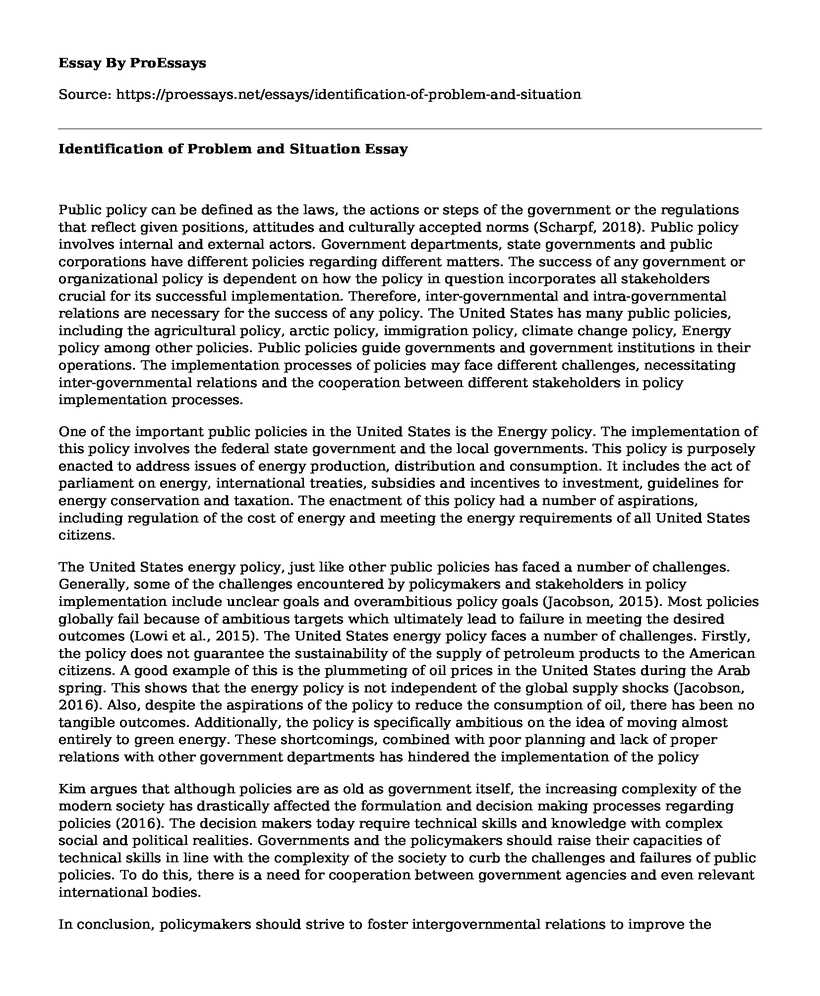Public policy can be defined as the laws, the actions or steps of the government or the regulations that reflect given positions, attitudes and culturally accepted norms (Scharpf, 2018). Public policy involves internal and external actors. Government departments, state governments and public corporations have different policies regarding different matters. The success of any government or organizational policy is dependent on how the policy in question incorporates all stakeholders crucial for its successful implementation. Therefore, inter-governmental and intra-governmental relations are necessary for the success of any policy. The United States has many public policies, including the agricultural policy, arctic policy, immigration policy, climate change policy, Energy policy among other policies. Public policies guide governments and government institutions in their operations. The implementation processes of policies may face different challenges, necessitating inter-governmental relations and the cooperation between different stakeholders in policy implementation processes.
One of the important public policies in the United States is the Energy policy. The implementation of this policy involves the federal state government and the local governments. This policy is purposely enacted to address issues of energy production, distribution and consumption. It includes the act of parliament on energy, international treaties, subsidies and incentives to investment, guidelines for energy conservation and taxation. The enactment of this policy had a number of aspirations, including regulation of the cost of energy and meeting the energy requirements of all United States citizens.
The United States energy policy, just like other public policies has faced a number of challenges. Generally, some of the challenges encountered by policymakers and stakeholders in policy implementation include unclear goals and overambitious policy goals (Jacobson, 2015). Most policies globally fail because of ambitious targets which ultimately lead to failure in meeting the desired outcomes (Lowi et al., 2015). The United States energy policy faces a number of challenges. Firstly, the policy does not guarantee the sustainability of the supply of petroleum products to the American citizens. A good example of this is the plummeting of oil prices in the United States during the Arab spring. This shows that the energy policy is not independent of the global supply shocks (Jacobson, 2016). Also, despite the aspirations of the policy to reduce the consumption of oil, there has been no tangible outcomes. Additionally, the policy is specifically ambitious on the idea of moving almost entirely to green energy. These shortcomings, combined with poor planning and lack of proper relations with other government departments has hindered the implementation of the policy
Kim argues that although policies are as old as government itself, the increasing complexity of the modern society has drastically affected the formulation and decision making processes regarding policies (2016). The decision makers today require technical skills and knowledge with complex social and political realities. Governments and the policymakers should raise their capacities of technical skills in line with the complexity of the society to curb the challenges and failures of public policies. To do this, there is a need for cooperation between government agencies and even relevant international bodies.
In conclusion, policymakers should strive to foster intergovernmental relations to improve the implementation processes of policies. The people charged with implementing the United States energy policy have to cooperate with both local and international players in the energy sector. The success of the policy may require the consideration of international policies and agreements, guidelines on oil exports and refining, among other considerations. Aside from the United States energy policy, all public policies require high level relations and cooperation with relevant bodies in order to ensure efficiency in their implementation.
References.
Federal Agencies: An Analysis Focused on Formalization, Span of Control, Headquarters
Ratio, and Personnel Mobility. Administration & Society, 48(8), 988-1030.
Jacobson, M. Z., Delucchi, M. A., Bazouin, G., Bauer, Z. A., Heavey, C. C., Fisher,
E., & Yeskoo, T. W. (2015). 100% clean and renewable wind, water, and sunlight (WWS) all-sector energy roadmaps for the 50 United States. Energy & Environmental Science, 8(7), 2093-2117.
Lowi, T. J., & Nicholson, N. K. (2015). Arenas of power: Reflections on politics
And policy. Routledge.
Kim, Y. (2016). The Relation between Policy Types and Organizational Structures in US
Scharpf, F. W. (2018). Games real actors play: Actor-centered institutionalism
In policy research. Routledge.
Cite this page
Identification of Problem and Situation. (2022, May 17). Retrieved from https://proessays.net/essays/identification-of-problem-and-situation
If you are the original author of this essay and no longer wish to have it published on the ProEssays website, please click below to request its removal:
- Micro Language Policy for a Hotel Essay
- Ethical Issues: Non-Monogamy Relationship Essay Example
- Essay Example on Fairtrade Social Movement: Securing a Better Future for Coffee Farmers
- Essay Example on Protecting Patient Data: The Persistent Challenge of Data Breaches
- Free Paper Sample on SEO Spam: Manipulating Search Indexes & Black Hat SEOs
- Paper Example on Age-Related Changes: Nutritional Challenges & Health Risks
- Essay Sample on Serving the Community: Managing the Istanbul Football Academy in Nairobi, Kenya







